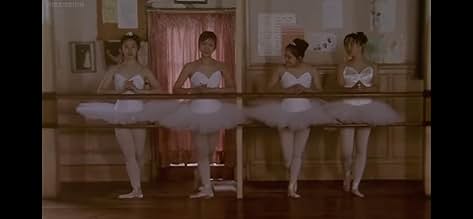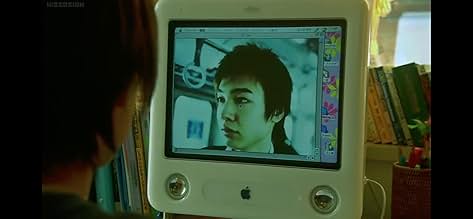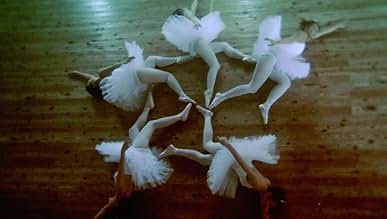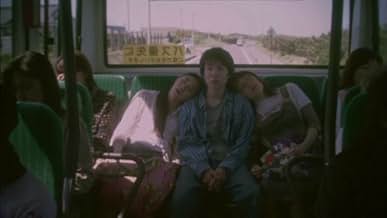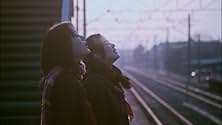Hana to Arisu
- 2004
- 2h 15min
VALUTAZIONE IMDb
7,2/10
5192
LA TUA VALUTAZIONE
Quando due migliori amici si innamorano dello stesso ragazzo, sviluppano un piano per indurlo a uscire con loro.Quando due migliori amici si innamorano dello stesso ragazzo, sviluppano un piano per indurlo a uscire con loro.Quando due migliori amici si innamorano dello stesso ragazzo, sviluppano un piano per indurlo a uscire con loro.
- Regia
- Sceneggiatura
- Star
- Premi
- 1 vittoria in totale
Recensioni in evidenza
After the dark world of _All About Lily Chou Chou_ in which junior high kids are involved in prostitution, extortion, and murder, Iwai returns with _Hana and Alice_, a film that brings the audience to the tried and true theme of the love triangle. This time involving the young trio of Hana, Alice, and Masashi.
The story begins with the friends Hana, acted by Suzuki Anne, _Returner_, _9 Souls_, and Alice, Aoi Yu, _All About Lily Chou Chou_, _Harmful Insect_, crossing frozen fields to a distant train station. There, Alice shows Hana the object of her affection: a tall Japanese-American. The two girls ride the the train many times. Even taking secret photographs of biracial young man and a younger student who they assume is his half-brother.
However, eventually, Alice's crush is gone and only the younger man, whose nose is always in a book, rides the train. Alice is heartbroken, But Hana continues riding the train, affection for the young man growing in her heart.
When high school begins, Hana joins the Rakugo club because her crush, Miyamoto Masashi, is also a member of the club. One day, while following her crush, Hana witnesses Masashi hits his head hard on a garage door knocking him to the ground. Hana rushes up to him and asks him if he is okay. Masashi begins reciting some of his rakugo lines and is convinced that he is okay, but Hana asks him if he remembers her. On this he is not so clear, Hana then states that she is his girlfriend. This of course shocks Masashi and so begins the process of Masashi trying to recover from an amnesia created by the lovesick Hana.
I was worried by the premise of this film at first, because it has been done a number of times before. However, I should have had more faith in Iwai Shunji. This is truly a good film and it really tugs on the heart strings. Those of us who have had our love for someone else non-reciprocated while definitely be touched. The acting is well done. Especially that of Aoi Yu who played Tsuda Shiori, the young girl forced to be a prostitute in _Lily Chou Chou_. The music, as always, is very nice, and this time it was actually composed by Iwai Shunji.
The story begins with the friends Hana, acted by Suzuki Anne, _Returner_, _9 Souls_, and Alice, Aoi Yu, _All About Lily Chou Chou_, _Harmful Insect_, crossing frozen fields to a distant train station. There, Alice shows Hana the object of her affection: a tall Japanese-American. The two girls ride the the train many times. Even taking secret photographs of biracial young man and a younger student who they assume is his half-brother.
However, eventually, Alice's crush is gone and only the younger man, whose nose is always in a book, rides the train. Alice is heartbroken, But Hana continues riding the train, affection for the young man growing in her heart.
When high school begins, Hana joins the Rakugo club because her crush, Miyamoto Masashi, is also a member of the club. One day, while following her crush, Hana witnesses Masashi hits his head hard on a garage door knocking him to the ground. Hana rushes up to him and asks him if he is okay. Masashi begins reciting some of his rakugo lines and is convinced that he is okay, but Hana asks him if he remembers her. On this he is not so clear, Hana then states that she is his girlfriend. This of course shocks Masashi and so begins the process of Masashi trying to recover from an amnesia created by the lovesick Hana.
I was worried by the premise of this film at first, because it has been done a number of times before. However, I should have had more faith in Iwai Shunji. This is truly a good film and it really tugs on the heart strings. Those of us who have had our love for someone else non-reciprocated while definitely be touched. The acting is well done. Especially that of Aoi Yu who played Tsuda Shiori, the young girl forced to be a prostitute in _Lily Chou Chou_. The music, as always, is very nice, and this time it was actually composed by Iwai Shunji.
"Hana & Alice" began as a series of shorts to promote Nestle's Kit-Kat candy bars. Through the genius of director Shunji Iwai, this evolved into not just a feature film but a darned profound one. In the DVD features he talks about how much of the movie was improvised, but it doesn't show. The end result is a very thoughtful, seemingly carefully-planned, poetic view of friendship, memories, and our individual yearnings for things that are out of our grasp.
The plot itself is very cute and interesting: a girl conspires to snatch a boyfriend by convincing the boy that he has amnesia and is in love with her. He's just dense enough to fall for it. But things get tricky when he starts asking questions, causing the girl to enlist the help of her best friend in deceiving him. It's a great comedy of Shakespearean proportions, but what makes it particularly fun to watch is the gorgeous way in which it's told.
If you're unfamiliar with the works of Shunji Iwai, this is a great place to start. He is a great, artistic director who does not necessarily get bogged down in poetry beyond the realm of mere mortals such as us. In other words, he has a unique visionary style that's not pretentious or overly "experimental". If I were to sum up his style in one sentence, it would be that he allows the scene to speak for itself without too many camera theatrics. You can expect to see long scenes without disruptive cuts, without much camera motion or with a simple, graceful, linear camera movement following the actors rather than jumpy "MTv editing". This is actually an approach used by several great Japanese directors I've seen, like Hideaki Anno ("Ritual") and Takeshi Kitano ("Fireworks", "Kikujoro") and perhaps it is derived from the master Kurosawa himself.
Something else worth noting is that the director composed all the music himself, furthering the idea that the presentation we get is very lucid and consistent with itself. The music compliments each scene as if telling the story, as opposed to background filler.
While the plot may seem straightforward, there's actually quite a lot of complexity under the surface. Each character is driven by some inner yearning, and their actions are not necessarily clear until you discover what drives each person. Thus, things remain unpredictable until the end, when you get a chance to digest why each person is the way they are.
There's fantastic acting all around, and both Anne Suzuki ("Hana") and Yû Aoi ("Alice") get a chance to shine. Hana's moment is in a powerful monologue near the end, while Alice's moment is in a gorgeous ballet routine which will stun you into silence.
Much like German director Wim Wenders' film "Lisbon Story" which began as a promotional spot for the city of Lisbon yet evolved into a poetic masterpiece, Shunji Iwai's "Hana & Alice" is just about the best candy bar commercial you'll ever see in your life.
The plot itself is very cute and interesting: a girl conspires to snatch a boyfriend by convincing the boy that he has amnesia and is in love with her. He's just dense enough to fall for it. But things get tricky when he starts asking questions, causing the girl to enlist the help of her best friend in deceiving him. It's a great comedy of Shakespearean proportions, but what makes it particularly fun to watch is the gorgeous way in which it's told.
If you're unfamiliar with the works of Shunji Iwai, this is a great place to start. He is a great, artistic director who does not necessarily get bogged down in poetry beyond the realm of mere mortals such as us. In other words, he has a unique visionary style that's not pretentious or overly "experimental". If I were to sum up his style in one sentence, it would be that he allows the scene to speak for itself without too many camera theatrics. You can expect to see long scenes without disruptive cuts, without much camera motion or with a simple, graceful, linear camera movement following the actors rather than jumpy "MTv editing". This is actually an approach used by several great Japanese directors I've seen, like Hideaki Anno ("Ritual") and Takeshi Kitano ("Fireworks", "Kikujoro") and perhaps it is derived from the master Kurosawa himself.
Something else worth noting is that the director composed all the music himself, furthering the idea that the presentation we get is very lucid and consistent with itself. The music compliments each scene as if telling the story, as opposed to background filler.
While the plot may seem straightforward, there's actually quite a lot of complexity under the surface. Each character is driven by some inner yearning, and their actions are not necessarily clear until you discover what drives each person. Thus, things remain unpredictable until the end, when you get a chance to digest why each person is the way they are.
There's fantastic acting all around, and both Anne Suzuki ("Hana") and Yû Aoi ("Alice") get a chance to shine. Hana's moment is in a powerful monologue near the end, while Alice's moment is in a gorgeous ballet routine which will stun you into silence.
Much like German director Wim Wenders' film "Lisbon Story" which began as a promotional spot for the city of Lisbon yet evolved into a poetic masterpiece, Shunji Iwai's "Hana & Alice" is just about the best candy bar commercial you'll ever see in your life.
From the dark world of junior high school boys in "All about Lily Chou-chou", Iwai has shifted to the lighter world of two high school girls.
Hana and Alice are best friends who do everything together. Alice is the leader of the pair, so it is no surprise when Hana follows her on an early morning expedition to the train station where Alice's latest crush gets the train in to school. Alice soon tires of her crush, but Hana meanwhile has fallen for the crush's "younger brother" Miyamoto and continues the trek to the station by herself.
When the two matriculate at the high school that Miyamoto already attends, Hana enters the rakugo (traditional comedic storytelling) club of which Miyamoto is one of two members. And when one day Miyamoto takes a nasty blow to the head she enters into a crazy scheme to get him to fall in love with her.
Alice, meanwhile, has troubles of her own dealing with a flighty mother, a father she rarely sees, and trying to find herself through a series of acting and modeling auditions after being scouted on the streets of Tokyo. And when she gets roped in to Hana's scheme she finds that Miyamoto is falling for her instead, and her relationship with Hana may be threatened.
The two main characters are real and appealing, neither is one-dimensional. Miyamoto is less interesting, and his motivation less clear. The visuals, as usual, are beautiful especially the frozen fields, cherry blossom lanes, and the ballet scenes. Music always plays an important part in Iwai films (especially Swallowtail and Lily Chou-chou), and the music in this one is very good (composed this time by Iwai himself)... but there are points where it is hard to tell which is the focus, the music or the story. Sometimes it seems that the movie is there to complement the music, and not the other way around.
Also the story has a tendency to wander, and may seem long to someone looking for a straight forward love/friendship story.
Personally I enjoyed the film... and found it got better on repeated viewings... I found Aoi Yu and Suzuki Anne very easy to relate to, recalling the confusion, insecurities, etc of high school days. It is one of Iwai's more comedic pieces, and at the same time subtly moving. It was not overly simplistic or clear cut. And I especially enjoyed Aoi's ballet solo toward the end of the film (both for the solo itself and it's place in the story) I think that fans of Iwai's style will enjoy it.
Keep an eye out for the many cameos (Hirosue Ryoko (of ARITA), Osawa Takao (of Lily Chou-chou), Ito Ayumi (of Swallowtail and Lily Chou-chou)... Abe Hiroshi, Yoshioka Hidetaka (voice only)... and many others)
Hana and Alice are best friends who do everything together. Alice is the leader of the pair, so it is no surprise when Hana follows her on an early morning expedition to the train station where Alice's latest crush gets the train in to school. Alice soon tires of her crush, but Hana meanwhile has fallen for the crush's "younger brother" Miyamoto and continues the trek to the station by herself.
When the two matriculate at the high school that Miyamoto already attends, Hana enters the rakugo (traditional comedic storytelling) club of which Miyamoto is one of two members. And when one day Miyamoto takes a nasty blow to the head she enters into a crazy scheme to get him to fall in love with her.
Alice, meanwhile, has troubles of her own dealing with a flighty mother, a father she rarely sees, and trying to find herself through a series of acting and modeling auditions after being scouted on the streets of Tokyo. And when she gets roped in to Hana's scheme she finds that Miyamoto is falling for her instead, and her relationship with Hana may be threatened.
The two main characters are real and appealing, neither is one-dimensional. Miyamoto is less interesting, and his motivation less clear. The visuals, as usual, are beautiful especially the frozen fields, cherry blossom lanes, and the ballet scenes. Music always plays an important part in Iwai films (especially Swallowtail and Lily Chou-chou), and the music in this one is very good (composed this time by Iwai himself)... but there are points where it is hard to tell which is the focus, the music or the story. Sometimes it seems that the movie is there to complement the music, and not the other way around.
Also the story has a tendency to wander, and may seem long to someone looking for a straight forward love/friendship story.
Personally I enjoyed the film... and found it got better on repeated viewings... I found Aoi Yu and Suzuki Anne very easy to relate to, recalling the confusion, insecurities, etc of high school days. It is one of Iwai's more comedic pieces, and at the same time subtly moving. It was not overly simplistic or clear cut. And I especially enjoyed Aoi's ballet solo toward the end of the film (both for the solo itself and it's place in the story) I think that fans of Iwai's style will enjoy it.
Keep an eye out for the many cameos (Hirosue Ryoko (of ARITA), Osawa Takao (of Lily Chou-chou), Ito Ayumi (of Swallowtail and Lily Chou-chou)... Abe Hiroshi, Yoshioka Hidetaka (voice only)... and many others)
Near the end of Mike Leigh's Vera Drake (trivial spoiler about Vera Drake but not about Hana and
), Imelda Staunton's Vera stands accused, caught, guilty. For what seems an eternity of fictional if not real time, before an ever-expanding body of those-who-know, she displays, in her eyes and quivery cheeks and chin, her shame. Shame's a fluid thing, grows, changes as one's conscience, if that's what it is, reaches about for new embarrassment on which to feed, and so is Vera's face in these scenes ever-changing. Time races, falls with a dreadful weight, but at the same instant it stops dead. Such embarrassments eventually slip our minds. Everyday rote erases them. We banish, delete, forget them, as well as we can, but they never exactly end. Each moment itself is something like eternal.
Elsewhere I've remarked the map-ability of Iwai's films: Uchiage hanabi, shita kara Miruka? Yoko kara Miruka? (1993) with both it's title conundrum and the on-the-road debarkation point for the alternate endings; April Story with its out-of-place fly casting; Love Letter in which doppelganger heroines overlap in space but never meet; Picnic whose protagonists walk the top edge of a wall that miraculously traverses their city; Yentown where the map one lives represents one's caste. Lily Chou Chou I haven't found time yet to re-watch and digest, but its characters travel, both locally and afar to that "Disney Jungle Ride" bit, and its concert throng near the end moves in a single direction that killer moves against. Motion needs map-able space. Iwai playing a film "director," in Hideyaki Anno's Ritual, walks/strolls/travels into and through the story and the maybe-mad girl's space. Undo has none of this. You hardly know where one set is in relation to another, as if linear space has collapsed into Moemi's bindings.
In Hana and Alice as in Undo, only the protagonists connect sets: trains, school, parkland, dance floor, etc. If anything in it is map-able, it's the two girls', and deadpan Miyamoto's, faces. Whether she's scheming, at a loss, or caught, Hana's face quivers with unceasing thought, at least as credibly and no less momentously than Vera caught. Like many liars, Hana thinks too much. She hasn't mastered yet the art of not thinking, seems not to realize the ease and simplicity of truth-telling. We see, much more often than hear, what Hana is thinking. Though the film's full of music, Hana's pre-verbal, or anti-verbal, thoughts reach us as if in dead silence, in what sounds like silent-film silence. Iwai's camera and his choice of close-ups of both girls suggest he knows this. I imagine Iwai cast Suzuki as Hana because of this silent ability. She'd displayed it to less merit in Returner. Aoi plays Alice less externally, or at least less facially. (My terminology's confusing. Alice is more of an introvert, perhaps, so uses body language which is external. But her face, early on, reveals less.) Note her mime-like dance in the animal suit: She slowly, magically reenters Hana's and our perception. At first Hana and we, for Hana, don't know whether to be annoyed. Is it one of those annoying stalking mimes? Is it sane?
Besides in faces, map Hana and Alice in Time. Amnesia's about losing Time, time already used, already spent, used up, gone, and so wasted if not remembered. The plot's machinations, Miyamoto's beyond-belief credibility, his in and out, on and off belief in the branchings of Hana's out-of-control lie, bend Time. Hana hands him a past, a chunk of time, then implicates Alice in yet another. Riding Hana's materialized daydream, Miyamoto travels to and fro, back and fore, but not in space. Hana and Alice is Iwai's La jetée.
But guess what! The film is hilarious. I can't think offhand of another film as simultaneously pictorial, euphonious, and simply funny. The humor is anything but situational. It has the warming reality of the everyday, of things and people we all know, because it transpires in the two girls cheeks, brows, and eyes.
There was a temptation to call H & A All About Lily Chou Chou's light antithesis. I don't feel that, choose not to. For touch points, besides La jetée and silent film, look maybe to Shakespeare's comedies, maybe even to his noisome clowns.
Elsewhere I've remarked the map-ability of Iwai's films: Uchiage hanabi, shita kara Miruka? Yoko kara Miruka? (1993) with both it's title conundrum and the on-the-road debarkation point for the alternate endings; April Story with its out-of-place fly casting; Love Letter in which doppelganger heroines overlap in space but never meet; Picnic whose protagonists walk the top edge of a wall that miraculously traverses their city; Yentown where the map one lives represents one's caste. Lily Chou Chou I haven't found time yet to re-watch and digest, but its characters travel, both locally and afar to that "Disney Jungle Ride" bit, and its concert throng near the end moves in a single direction that killer moves against. Motion needs map-able space. Iwai playing a film "director," in Hideyaki Anno's Ritual, walks/strolls/travels into and through the story and the maybe-mad girl's space. Undo has none of this. You hardly know where one set is in relation to another, as if linear space has collapsed into Moemi's bindings.
In Hana and Alice as in Undo, only the protagonists connect sets: trains, school, parkland, dance floor, etc. If anything in it is map-able, it's the two girls', and deadpan Miyamoto's, faces. Whether she's scheming, at a loss, or caught, Hana's face quivers with unceasing thought, at least as credibly and no less momentously than Vera caught. Like many liars, Hana thinks too much. She hasn't mastered yet the art of not thinking, seems not to realize the ease and simplicity of truth-telling. We see, much more often than hear, what Hana is thinking. Though the film's full of music, Hana's pre-verbal, or anti-verbal, thoughts reach us as if in dead silence, in what sounds like silent-film silence. Iwai's camera and his choice of close-ups of both girls suggest he knows this. I imagine Iwai cast Suzuki as Hana because of this silent ability. She'd displayed it to less merit in Returner. Aoi plays Alice less externally, or at least less facially. (My terminology's confusing. Alice is more of an introvert, perhaps, so uses body language which is external. But her face, early on, reveals less.) Note her mime-like dance in the animal suit: She slowly, magically reenters Hana's and our perception. At first Hana and we, for Hana, don't know whether to be annoyed. Is it one of those annoying stalking mimes? Is it sane?
Besides in faces, map Hana and Alice in Time. Amnesia's about losing Time, time already used, already spent, used up, gone, and so wasted if not remembered. The plot's machinations, Miyamoto's beyond-belief credibility, his in and out, on and off belief in the branchings of Hana's out-of-control lie, bend Time. Hana hands him a past, a chunk of time, then implicates Alice in yet another. Riding Hana's materialized daydream, Miyamoto travels to and fro, back and fore, but not in space. Hana and Alice is Iwai's La jetée.
But guess what! The film is hilarious. I can't think offhand of another film as simultaneously pictorial, euphonious, and simply funny. The humor is anything but situational. It has the warming reality of the everyday, of things and people we all know, because it transpires in the two girls cheeks, brows, and eyes.
There was a temptation to call H & A All About Lily Chou Chou's light antithesis. I don't feel that, choose not to. For touch points, besides La jetée and silent film, look maybe to Shakespeare's comedies, maybe even to his noisome clowns.
2 teenage girls who are best friends are into the same boy ... Coming from Hollywood such a movie would be shallow for sure, in the style of numerous other high school comedies. Japanese director Shunji Iwai, however, managed to make a movie out of this material which has a lot of depth, a movie that is rich of subtle, moving moments. Rather than showing a simple love story, the focus of the movie is clearly the two girls and their friendship, and how it is being put on the test. Hana and Alice are simply adoring when they quickly come up with another hilarious lie to back up each others made up stories. On the other hand, their love interest is slow and passive most of the time, it seems like he is sleepwalking at times. Unlike Hollywood movies it's a lot about the unsaid, and be prepared that not everything is explained. The film never becomes sentimental nor too heavy, because the drama is lightened up with quite a bit of humor. A very watchable movie indeed ...
Lo sapevi?
- QuizAlthough released almost 11 years before Hana e Alice: il caso di omicidio (2015), this movie actually serves as the sequel.
- Citazioni
Setsuko "Alice" Arisugawa: I saw 'Hannibal' on satellite last night.
Hana: So did I.
Setsuko "Alice" Arisugawa: I was scared.
Hana: Isn't he creepy?
Setsuko "Alice" Arisugawa: Yeah. Don't you think real people are scarier... than zombies and ghosts?
- ConnessioniFeatures La grande avventura del piccolo principe Valiant (1968)
I più visti
Accedi per valutare e creare un elenco di titoli salvati per ottenere consigli personalizzati
- How long is Hana and Alice?Powered by Alexa
Dettagli
Botteghino
- Lordo in tutto il mondo
- 654.448 USD
Contribuisci a questa pagina
Suggerisci una modifica o aggiungi i contenuti mancanti


